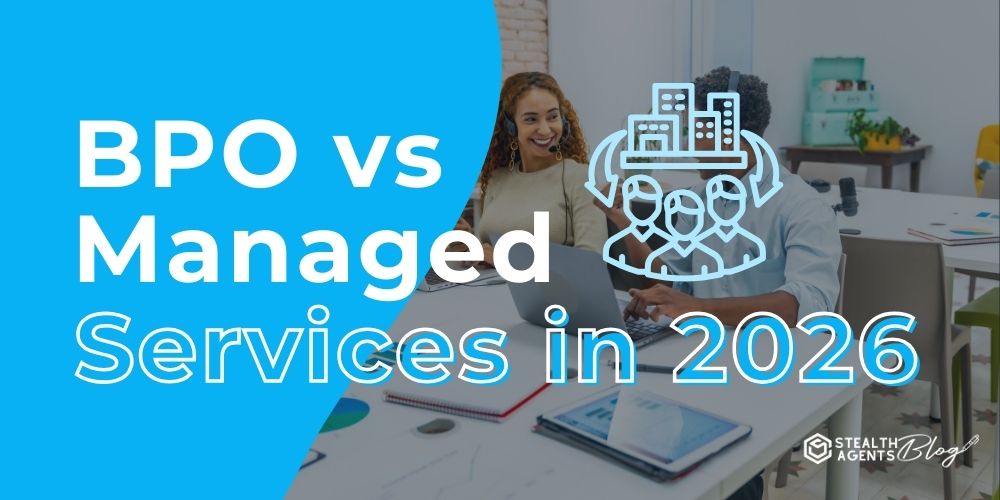BPO vs Managed Services is all about choosing the right support model for your business goals, whether it’s task-based help or full-service operational management. Stealth Agents makes that choice simple by offering managed services that deliver expert virtual assistants, scalable support, and long-term efficiency, so you can grow without the overhead.
Making the right decision between BPO and managed services can transform your business.
BPO (Business Process Outsourcing) handles specific tasks such as customer support and data management, while Managed Services comprehensively manage IT and operational needs.
BPO vs. managed services are designed to save businesses time and resources, but knowing which suits your requirements is essential.
Rising labor costs and inefficient workflows remain significant challenges for businesses today.
With Stealth Agents, you can hire skilled virtual assistants who streamline your operations while keeping expenses low.
Research shows that outsourcing can cut operational costs by up to 70%, allowing you to focus on what matters most.
Book a free consultation today to discover how Stealth Agents can streamline your tasks and explore our virtual assistant pricing.
BPO vs. Managed Services
Business Process Outsourcing (BPO) and Managed Services are two distinct outsourcing models that address different business needs.
- Business Process Outsourcing (BPO)
primarily focuses on outsourcing specific, individual business tasks or processes to a third-party provider. This model is typically task-oriented and output-focused. Common examples include customer support call centers, data entry, payroll processing, and other routine back-office operations.
The main goal of BPO is often to reduce costs and efficiently manage high-volume, repeatable workloads. The relationship tends to be more transactional, centered on completing defined tasks.
- Managed Services
on the other hand, involve outsourcing an entire operational function, where the provider takes full responsibility for its performance and outcomes. This is common for complex areas like IT infrastructure, cybersecurity, and cloud management.
A Managed Service Provider (MSP) doesn’t just perform tasks; they proactively monitor, manage, optimize, and strategize for the entire function. This approach fosters a long-term, proactive partnership where the provider is accountable for the results and continuous improvement of the outsourced area.
What Are The Key Differences Between BPO And Managed Services?
1. Definition and Scope of Services
BPO, or Business Process Outsourcing, primarily involves hiring external companies to handle specific, often repetitive, operational tasks or processes.
These BPO services in the USA can include customer support, data entry, payroll processing, and other administrative activities, allowing businesses to focus on their core competencies.
Managed services, by contrast, go beyond task-specific responsibilities.
Managed services involve hiring vendors to fully own particular functions, such as IT management, cybersecurity, or even cloud-based solutions.
These vendors act as long-term partners and provide continuous monitoring, analysis, and improvement.
The differences between BPO and managed services start to show in this broader scope of responsibilities.
Philippines BPO providers often concentrate on well-defined areas or single segments of work.
At the same time, managed services aim to manage entire functions, offering consistent expertise that evolves with the company’s needs.
2. Industry Application and Use Cases
Finance and accounting BPO services are commonly used across industries for tasks like call center management, transaction processing, and recruitment.
These services allow businesses to access trained professionals without requiring extensive in-house teams, saving time and operational costs.
Managed services differ significantly in their applications, as organizations often adopt them to improve technological infrastructure or enhance operational capabilities.
Managed IT service answering services are crucial in IT, network security management, and optimization of cloud services.
The difference between BPO and managed services can be observed in the level of involvement in the company’s operations.
BPO providers focus on addressing isolated issues, whereas managed service providers (MSPs) integrate into the organization to oversee complete functions.
For instance, while BPO hiring may efficiently handle employee payroll processing, a managed service provider might manage the entire HR system, enabling better data integration and compliance.
3. Cost Structure and Approach
The pricing model for BPO usually involves a pay-per-task or pay-per-output system, which helps businesses control costs for specific services.
This model makes BPO appealing to companies seeking budget-friendly solutions for routine business processes.
However, the managed security service provider (MSSP) answering service operates on a subscription-based pricing model.
Clients typically pay a monthly or yearly fee for comprehensive service packages tailored to their needs.
This ensures that managed service providers maintain a consistent presence and collaborate with their clients over the long term.
BPO vs. managed services differ in cost structure and how these costs align with scalability.
While BPO costs tend to increase proportionally with the number of tasks performed, managed services offer predictable expenses and insights for budgeting.
4. Technology Dependence and Integration
BPO services rely less on technology integration and more on human skills such as administrative support, sales, or customer service.
Technology may be involved but is often limited to tools that aid in task execution rather than overall system management.
Managed services are deeply technology-driven, making them indispensable for companies looking to maintain competitive IT infrastructures and ensure digital security.
Managed service providers implement advanced tools, monitoring techniques, and data-driven insights to keep systems running smoothly.
One key difference between BPO and managed services lies in this emphasis on tech adoption.
Managed services introduce automation, analytics, and other innovations to monitor and improve operational efficiency.
This is more than what typical BPO arrangements usually include.
5. Relationship Dynamics Between Provider and Client
A provider’s relationship is often transactional and task-focused.
Businesses collaborate with external vendors for specific processes, performing tasks based on predefined requirements and timelines.
Managed services take a more collaborative and long-term partnership approach.
These providers invest in understanding the client’s business objectives and align their services accordingly, offering active engagement and strategic guidance.
BPO vs. managed services also differ in accountability.
BPO providers deliver on agreed responsibilities, but managed service providers go further by continuously monitoring and suggesting improvements to enhance business performance.
Hiring managed services enhances relationships by ensuring both parties work towards shared goals, fostering trust and communication.
6. Goals and Outcomes
BPO is primarily result-driven, focusing on fulfilling agreed deliverables within set deadlines.
This option is suitable for organizations seeking precise, targeted solutions without ongoing strategic involvement from the service provider.
Managed services, on the other hand, prioritize continuous improvement and long-term growth.
They aim to comprehensively align with the company’s broader objectives, handling systems such as IT infrastructure or communication networks.
Businesses comparing BPO vs. managed services should consider whether they need short-term fixes or sustained development.
BPO is a practical choice if you want to hire providers for singular operations like payroll or data management.
Companies looking to transform their technical capabilities may find managed services indispensable, as they provide seamless integration and monitoring of complex processes.
7. Flexibility and Scalability
BPO offers a high degree of flexibility by allowing companies to scale specific tasks per their needs.
This allows businesses to address seasonal fluctuations or unexpected workload increases without committing to long-term agreements.
Managed services instead take a broader and more dedicated approach to scalability.
Providers offer options to scale service packages according to growing business demands over extended periods.
This is often paired with continuous improvements in tools and systems.
The scalability of BPO versus managed services differs significantly.
BPO is best suited for businesses seeking task-based expansion, whereas managed services are better suited to evolving operational strategies and large-scale systems.
8. Expertise and Skill Level
BPO services typically focus on providing workforce expertise at an operational level.
BPO providers ensure that staff are trained to meet the specific requirements of the tasks assigned, targeting efficiency and quality within those areas.
Managed services rely on a mixture of technical expertise and strategic insight.
The professionals managing these services understand complex systems and offer advanced skill sets for IT monitoring and cybersecurity roles.
The key distinction between BPO and managed services lies in the breadth of knowledge provided.
While BPO specializes in efficient task execution, managed services bring extensive expertise across various domains.
Hiring managed service providers becomes essential for businesses dealing with technical challenges or looking to adopt advanced operations.
However, those desiring only task-based skills will find hiring BPO services with defined skills and functions more practical.
9. Risk Management and Accountability
BPO services are limited in their involvement in minimizing risks for their clients.
They focus on delivering the tasks and leave broader oversight and risk management to the hiring company.
Managed service providers offer built-in risk management practices to mitigate potential issues before they arise.
This includes frequent assessments, ongoing monitoring, and policy adjustments that ensure system stability.
The main variation between BPO and managed services lies in this approach to accountability.
By taking a proactive stance, managed services reduce the likelihood of disruptions for their clients, creating more reliable partnership dynamics.
Hiring managed services means accessing professionals dedicated to maintaining smooth operations while factoring in future risks.
10. Customization Versus Standardization
BPO services often focus on standardized processes to efficiently handle high volumes of tasks.
This is well-suited for repetitive duties like entering data or responding to customer queries, where uniformity in execution is key.
Managed services, on the other hand, excel in tailoring their offerings to match specific business objectives.
Service providers prioritize customizing technologies, workflows, and strategies to align with the client’s goals.
Choosing BPO vs. managed services depends on how much customization a business requires.
Companies seeking generic solutions to routine operations should consider hiring BPO services.
However, those who need adaptable services designed to meet unique challenges will find managed services more appropriate.
How Do Businesses Decide Between BPO And Managed Services For Their Needs?
1. Evaluating the Core Business Needs
Businesses choosing between BPO and managed services must start by clarifying their specific requirements.
BPO primarily focuses on supporting repetitive tasks like customer support, data entry, and payroll, which helps free up internal resources for core business activities.
Managed services take a broader role by offering comprehensive solutions, such as IT management or network security, ensuring critical systems consistently perform at their best.
If an organization requires assistance with isolated tasks or functions, BPO can be an efficient solution.
On the other hand, managed services are often better suited for the connected, long-term oversight of specific business operations.
The key “BPO vs. managed services” highlights this fundamental difference, steering businesses to choose solutions that align with immediate or expansive operational goals.
Assessing the scope of the services required and how they impact overall efficiency helps companies make informed decisions.
2. Considering Scalability and Flexibility
Another critical factor for businesses is understanding their need for flexibility and scalability in operations.
BPO allows businesses to quickly scale specific tasks based on fluctuations in demand, making it ideal for seasonal or high-volume requirements.
Managed services emphasize scaling long-term partnerships and adapting packages over time to meet continually growing organizational needs.
The difference between BPO and managed services becomes evident in how they approach these changes over time.
If a business prioritizes flexible hiring for a single task or project, BPO provides an affordable and rapid solution.
Meanwhile, businesses planning for significant expansion or requiring ongoing, integrated support will find managed services a wiser choice.
Understanding these differences allows companies to align their service provider choice with current and future operational capacities.
3. Assessing Budget and Cost Structure
Cost is significant in deciding between BPO and managed services, as each offers distinct pricing models.
BPO often follows a pay-per-task structure, where businesses are charged based on the number or volume of tasks completed.
This structure is attractive to organizations that prefer short-term or volume-driven hiring.
Managed services apply subscription-based contracts, where companies pay a fixed fee for all-inclusive services covering broader functions.
Comparing cost benefits “in “BPO vs managed services” requires companies to evaluate whether they’re looking for an immediate or long-term return on investment.
Businesses with tight budgets or highly specialized task-based requirements typically lean toward BPO.
Meanwhile, companies valuing stability and ongoing support will likely invest in managed services.
4. Examining the Level of Expertise Needed
Some organizations determine their path by assessing the criticality of expertise for their desired function.
BPO provides skilled professionals trained in specific operational areas, with a focus on productivity and quality execution.
By contrast, managed services deliver technical proficiency and a deeper understanding of integrated systems, such as specialized IT or cybersecurity expertise.
By analyzing where BPO vs. managed services can add the most value, businesses can match their unique needs to the right provider.
For instance, hiring BPO efficiently handles areas like customer service or data entry, which demand simple skill sets.
However, hiring managed services supports more complex, tech-driven roles influencing organizational stability.
Factors like expertise levels weigh heavily on how companies finalize their decisions.
5. Long-Term Versus Short-Term Goals
The final determinant often lies in aligning services with business growth plans and strategic goals.
BPO is typically suited for addressing immediate needs like task- or process-specific support, offering quick turnarounds and reliable execution.
Managed services focus on ongoing partnerships, aligning with long-term goals such as consistent performance improvement and IT infrastructure management.
Comparing “BPO vs. managed services allows companies to decide how they want their external partnerships to support their growth trajectories.
Managed services guarantee lasting support and development for an enterprise aiming to balance immediate productivity with future planning.
Given its streamlined structure, businesses seeking immediate relief for repetitive tasks often find BPO preferable.
A clear understanding of short- and long-term goals ultimately guides smart decisions.
Can BPO Or Managed Services Help Reduce Staffing Costs?
BPO and managed services can play a key role in reducing staffing costs by offering businesses a way to focus on core activities while maintaining essential support functions.
Both options eliminate the need to hire a large in-house team, reducing the expenses tied to salaries, benefits, and training.
When comparing BPO vs. managed services, businesses often find that managed services provide more control and long-term partnership opportunities.
BPO, on the other hand, is ideal for handling repetitive or particular tasks at lower costs.
By thoughtfully considering BPO vs managed services, companies can address budget concerns without compromising quality or productivity.
This approach allows businesses to scale their workload effectively by only hiring for essential roles.
With careful planning, the decision between BPO and managed services can result in significant long-term savings.
How Can Hiring Through Stealth Agents Improve Business Performance?
Hiring through Stealth Agents can improve business performance by providing access to skilled professionals who can precisely handle specialized tasks.
This approach helps businesses save time and resources that would otherwise be spent on finding, hiring, and training full-time employees.
When comparing BPO vs. managed services, hiring through Stealth Agents reflects the benefits of managed services by ensuring consistent attention to critical functions.
It allows companies to focus on strategic growth while ensuring that essential support services run smoothly.
Stealth Agents can bridge gaps in workload management by providing the right expertise at the right time.
This method reduces the financial strain of hiring unnecessary in-house roles while still delivering high-quality performance.
By evaluating BPO vs. managed services, businesses can determine the most effective way to enhance operations through specialized hiring.
Takeaways
Determining the right choice between BPO and managed services is essential for businesses looking to launch quick-start projects efficiently and precisely.
Both options provide unique benefits, but the decision ultimately depends on the type of tasks and level of control your business requires.
For streamlined support, many companies turn to a virtual assistant to handle routine or time-consuming tasks, ensuring their core operations stay on track.
Stealth Agents can help provide skilled support tailored to your project needs, whether you’re leaning toward BPO or managed services.
Their expertise ensures you can access quality assistance, allowing you to focus on delivering results without compromising on time or budget.
To find the best solution for your preferences and explore pricing options, call Stealth Agents and book a complimentary discussion today.
Take the first step toward project success by partnering with experienced professionals who understand your goals.
Choosing the right support can change your business. Stealth Agents offers skilled virtual assistants to help you save time and money. Book a free consultation to find out how.
Frequently Asked Questions
How do BPO and Managed Services differ in terms of flexibility and adaptability?
BPO is flexible because it lets businesses adjust tasks based on demand, which is helpful when workloads change. Managed Services focus on long-term needs, adjusting their services as the business grows and changes over time.
What industries benefit most from BPO versus Managed Services?
BPO works well for industries with repetitive tasks, like customer service or finance. Managed Services are better for industries like IT and healthcare, where ongoing monitoring and management are important.
How can businesses evaluate the risk management capabilities of BPO vs. Managed Services?
For BPO, businesses should check how well the provider handles tasks efficiently. For Managed Services, they should look at how the provider monitors systems and manages risks to prevent problems before they happen.
What role does technology integration play in choosing between BPO and Managed Services?
Managed Services rely heavily on advanced technology to manage systems and improve processes. BPO focuses more on people handling tasks, with less use of technology, making it better for simpler processes.
How do BPO and Managed Services handle data security differently?
Managed Services include strong security measures and constant monitoring to protect data. BPO usually has basic security but focuses more on completing tasks, which may not be ideal for handling sensitive data.
What are the long-term cost implications of choosing BPO over Managed Services?
BPO can save money in the short term with task-based pricing, but frequent changes might increase costs over time. Managed Services offer steady costs with subscription plans, which can be more predictable and cost-effective in the long run.
How do BPO and Managed Services support business scalability?
BPO allows businesses to scale up or down by adding or reducing tasks as needed. Managed Services provide support for growing businesses by offering scalable systems and consistent help as operations expand.
What factors should businesses consider when deciding between BPO and Managed Services for strategic planning?
Businesses should think about whether they need short-term help or a long-term partner. BPO is good for handling specific tasks quickly, while Managed Services provide ongoing support that aligns with bigger business goals.
How can Managed Services enhance technological innovation compared to BPO?
Managed Services use advanced tools, automation, and data analysis to improve how systems work and stay competitive. BPO focuses on completing tasks and may not focus much on using new technology.
What are the key performance indicators for assessing the effectiveness of BPO vs. Managed Services?
For BPO, important measures include how accurate tasks are, how quickly they’re done, and how much money is saved. For Managed Services, key measures include system reliability, service quality, and how well they support long-term business goals.









